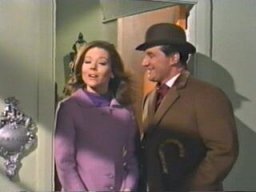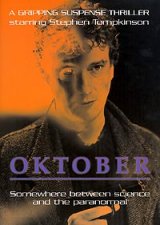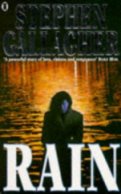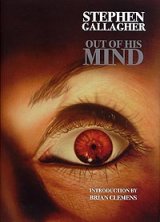
Stephen Gallagher is one of Britain's most respected and talented horror/thriller/ science fiction novelists, screenwriters and directors. Born in Salford, Lancashire on the 13th October, 1954, his books include Chimera, Valley of Lights, Oktober, Down River, The Boat House and White Bizango. A Former Northern Chair of the Writers' Guild of Great Britain, Stephen has become increasingly active on the TV and film front recently and this interview marks the release of the Oktober TV Movie on DVD, starring Stephen - Ballykissangel - Thomkinson....
Paul Kane: You started off going to drama school in the 1970s, where you made some student films. Did you ever think about going into acting at all, and is this something you might still do?
.jpg)
Stephen Gallagher: Yes I did, and no I won't. I think everybody who goes into drama probably has some form of the acting bug, but as soon as I found myself in the company of people with genuine talent I knew that I was never going to hack it. Which was good because I started to look around to determine what my actual niche might be. Fortunately I was doing a drama degree so there was a lot more to the course than acting. Theatre history, which I loved, and stage management, which I loved rather less. And there was an AV studio attached to the department. I wrote and directed a little 20-minute TV play, which hung together quite well, and got together with two friends to raise funds for am 8mm documentary on theatre buildings in Europe from Ancient Greece to the eighteenth century, which was a fantastic trip but a lousy film. They organised the logistics and I did the filming, so the credit's all theirs and the shame's all mine.
Paul Kane: Did you have any favourite TV shows and films growing up, anything that influenced your later work?
Stephen Gallagher: Sometimes I feel that I must have watched everything that was going. I know there were only two TV channels then, but even so... just about any significant piece of 60s television that ever gets cited, I seem to have seen it. Armchair Theatres, Wednesday Plays, all those landmark World in Action and This England documentaries. And movies, too... I've a bank of mental images from classic cinema like The Wages of Fear and Chimes at Midnight which I've no memory of acquiring, but they've been there since childhood. But my big love was the stuff that's now known as classic telefantasy, into which definition I can gather non-fantastical ITC-style series like The Saint or The Human Jungle with no problem. I thought Callan was brilliant. Top of the tree, without question, was The Avengers. Influence is a slightly trickier question. I tend to point to Whistle Down The Wind, which I saw with my grandmother at the Carlton cinema in Salford, as the big and, at first, unrealised early influence on my creative imagination. It's got this almost neorealist surface, and yet under it this enormous mythical tale of love and sacrifice and innocence lost. And it's full of fantastic craft that's so good it goes completely unnoticed. Tell me if there was ever a more perfectly-judged screen performance than Bernard Lee as Hayley Mills' dad.

Paul Kane: You're preaching to the converted there, Stephen. But how did you break into TV work in the first place, and what advice would you give anyone today who was trying to do the same?
Stephen Gallagher: That lousy 8mm documentary was a calling-card that got me into the offices of various film and TV people when I set out to look for work after university. Because it was on 8 mil no professional had the facilities to screen it, but its very existence and the circumstances of its production looked great on my CV. These days I'd be sunk, because it would be made on DV and people would ask to see a tape. But it got me into a researcher's job at Yorkshire TV and then a Presentation job at Granada. Neither of those was in TV drama, but some co-workers and I formed a kind of co-op to make a radio drama which we sold to the local commercial station. I was the writer. Building on what I learned from that venture, I wrote a spec radio play which I sold to Saturday Night Theatre at the BBC. My fourth SNT play was a science fiction piece which the producer, unbeknownst to me, sent over to the Doctor Who production office, as a result of which I got a call that led to a commission.The only advice I can offer is, make something. Write something. Do whatever it takes for you to cross the line from where all the wannabees are. Everything leads to something else. The thing that will get you to where you want to be is somewhere several stages down the line. All you can do is launch yourself in its vague direction.
Paul Kane: Which do you personally prefer, writing books or writing screenplays?
Stephen Gallagher: Whenever I'm doing one, I always yearn to be doing the other.
Paul Kane: Turning to Oktober now, where did the initial idea for come from back in the 80s?

Stephen Gallagher: We went on a camping holiday to the Bernese Oberland and stayed close to Interlaken. There's a mountain railway that goes right up inside the Eiger and emerges at an observatory on top of the Jungfrau, an incredible feat of engineering. On the way up, the line passes through a couple of villages before the final tunnel. I think they might even be wholly owned by the railway company. One's called Eigergletscher and as the train went through, I saw this bearded guy walking along the trackside with half a dozen big Eskimo dogs on leads. When I later got to meet him I learned that his name was Philippe Oriet, and he was the Keeper of the company's huskies. It all started from there…
Paul Kane: Well, you must be very pleased with the success of the venture. How do you feel about the fact that the disc allows it to be studied at A-Level and above?
Stephen Gallagher: Bemused and, I suppose, a bit intimidated. I know Matt Hills (Cultural studies lecturer who provides the audio commentary and analysis) and I'm very aware that the academic focus he brings to bear operates in a quite different way to my own methods.
Paul Kane: Oktober was to be made by Zenith a long time ago; is there any chance that the other novels optioned - such as Down River - might see the light of day now on TV…or maybe even as feature films? How about films such as The Boat House?

Stephen Gallagher:The Boat House is a tricky one because a fairly well-starred British feature director had a running option on it for a number of years, and we had some profound disagreements about the quality of the new scripts that were commissioned after I was dropped from the film. It wasn't just me being resentful over getting fired, I got over that. Even though my replacement was the director's office assistant, with no screenwriting experience or ability. Did I mention I'd got over it? It felt like an insult. But I'm over it. What followed were five first drafts from five different writers, only one of which was remotely makeable. As a result of all this the project now carries a turnaround cost well in excess of £100,000, which means that if I sell it again the director and his backers have to be recompensed out of the sale for their investment. Script costs like that are like small change to an American company, but they put the project out of the reach of most British producers working with British material.
As for the others, who knows? Down River foundered because there were no two young British leading men with the clout and star quality to carry a movie, and that's changed for the better in the last half-dozen years. Rain was dropped because a BBC Head of Department changed and wiped the slate of all his predecessor's projects, but the bodies of executives float past you down the river all the time. I turned down a lot of US offers for Red, Red Robin, all of them wanting to make it into a woman-in-peril TV movie. I wasn't going to waste an asset on a market like that.
Paul Kane: Good for you. Although it might be a bit of touchy subject, can you tell us about the Dracula project you were working on and what happened to it? What was so original about it and is there still a chance it might be made?
Stephen Gallagher: I'd wanted to do a period macabre piece for some time. I've got a project called Victorian Gothic which has been in development twice, once with Zenith and once with the BBC, and both times it's been finessed up to readiness and then dropped through scheduler indifference. Last time the word came back to me, Nobody will greenlight an original. The writing was fine, but they'd only consider a period piece if it was an adaptation. So I looked around for some seminal work in the genre that had never been adapted before, which is how two Christmases back I spent the holiday period looking for the screen story in Ann Radcliffe's The Mysteries of Udolpho. I cracked it, too. Which to anyone who knows the book is the literary equivalent of unravelling the structure of DNA. But this time the word was, No adaptations that aren't already familiar to an audience.
At which point Archie Tait (executive producer on Chimera, who knew of what I was trying to do) suggested Dracula. It had been one of the texts underlying Victorian Gothic - Bram Stoker was a key character in that story - so I'd absorbed it pretty well. My feeling was that nobody had done the book properly since Gerald Savory's 1970s adaptation, and that making a romantic hero out of Dracula could never approach the raw power of Nosferatu.
I won't insult you by explaining how the novel is a collage of second-hand perceptions, cast in the form of letters, journals, and dictated notes from the principal characters. This means that Dracula's offstage for much of the novel, which adds to his mystery and also to his credibility. But you don't get Dracula's version. It's there in Stoker and you can work it out by a kind of literary triangulation, but I've never seen it done and come out as Stoker. What you've always had from Lugosi onwards has been a romantic rapist, not Stoker's nasty-minded empty-hearted predator who insists to his dissipated party-girl 'brides' that he's capable of love, and then goes on to prove at great length that he isn't.
I went straight to script and wrote the first hour. Didn't even make a plan, just saw the way and went for it. Archie took that to BBC Wales and we got a commission. I got stuck into the second hour, and somewhere along the way the contracts turned up and I signed them. So far, so good. Then came the touchy stuff. I'm told that on the day I was set to deliver, a - now departed - drama exec in London heard of a proposed ITV/Martin Kemp version and cancelled our project that same afternoon. The news took over a week to reach Archie and me, during which time LWT hired a writer and announced to the press. Archie had a call from BBC Business Affairs trying to get out of payment, on the basis that I'd signed my side of the contract but they hadn't signed theirs. It was a really unpleasant time in which a 'go' project got cut off at the knees. The script had to go through a complete resubmission process, at the end of which it was felt that ITV had picked up too much of a lead. ITV's version was a dead duck by the end of the summer. I heard Martin Kemp vigorously distancing himself from it in an interview on FiveLive.

Paul Kane: The new collection of your shorts is from PS Publishing, Out of his Mind. What kind of stories are gathered together in there?
Stephen Gallagher: We aimed at the tone of those old Alfred Hitchcock anthologies. We even followed the Hitchcock format, of groups of stories interspersed with novellas. The introduction just came in, written by Brian Clemens. Brian Clemens! F*** me. You should see what he's written. Made my year.
Paul Kane: I've got to ask this, or fans of the series will kill me. Being a Doctor Who writer yourself in the past, what do you make of the revival idea and what direction would you like to see it move in?
Stephen Gallagher: : I've always said that Doctor Who is the BBC's one contender for a genuine international brand and that it's been consistently under-exploited. I'm told by those who've seen the first scripts that it's a genuinely exciting new take on the concept. But I've also heard that the budget for each episode is roughly the same as that of Spooks, and for an effects-driven sf show that isn't enough. Something's going to have to happen if it's going to happen, if you see what I mean.

Paul Kane: On to future projects now. Your novel Valley of Lights is due to be reprinted next year by Telos. Will there be any changes from the original version - for example, recent releases of The Manitou Man and Spectre all had additional material or alternative endings…?
Stephen Gallagher: No changes, but mucho extras. I've written a big accompanying article on the background and the research process and all the stuff that happened over the on-again off-again movie version, and we'll be including a diary that I kept when I went back to Phoenix with the production team. Steve Laws has interviewed me to winkle out some further info and opinions... there may be an introduction as well, but that'll be up to David H.
Paul Kane: Finally, can you tell us anything about the new SF drama you're developing for Granada, The Eleventh Hour, which is due to be screened in 2005?
Stephen Gallagher: It's a series of four 90-minute stories and it's a firm commission from ITV, which means that it's greenlit. They're science-based suspense stories. Not sf - we stay this side of the speculative line. Steve Connor, The Independent's Science Editor, is our consultant. The main character's based on a physics professor who makes an appearance in a novella that I wrote for Ellen Datlow's anthology The Dark. In that story he was a rationalist ghostbuster; in the non-supernatural series he's on the road with a suitcase and a sidekick, tasked with getting to the scene of any technology-based crisis before the politicians can get started on it.
Paul Kane: Every success with it, Steve, and thanks for giving the interview.
Stephen Gallagher: Thanks Paul.
Visit Stephen Gallagher's website at
http://www.stephengallagher.com
Interview (C) Paul Kane & Stephen Gallagher, 2004.